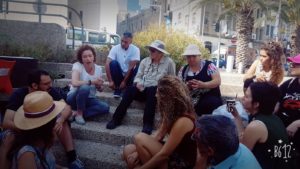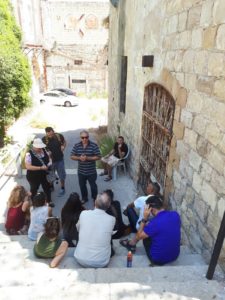Leaders for Change in Mixed Cities Visit Haifa
 One of the core objectives of the Leaders for Change in Mixed Cities program by the School for Peace is studying the unique aspects of mixed cities in Israel on a number of different levels— sociological, educational, economical and legal—especially through the eyes of participants in the course who live in such cities. Accordingly, on Friday September 8, the Haifa participants of the course organized a tour of the city which included the historical background of Haifa and its development, with special emphasis on the complexity in a city that is multi-cultural.We started the tour by meeting Dr. Einat Kalisch-Rotem, member of the Haifa City Council and chairperson of Living in Haifa party, who is nominated for mayor of Haifa. It was especially interesting to hear Dr. Kalisch-Rotem, who is a trained architect and urban planner, speak about her personal journey from academia to politics, about the importance of urban planning and conserving the Palestinian heritage of Haifa, and her vision for the future of Haifa.
One of the core objectives of the Leaders for Change in Mixed Cities program by the School for Peace is studying the unique aspects of mixed cities in Israel on a number of different levels— sociological, educational, economical and legal—especially through the eyes of participants in the course who live in such cities. Accordingly, on Friday September 8, the Haifa participants of the course organized a tour of the city which included the historical background of Haifa and its development, with special emphasis on the complexity in a city that is multi-cultural.We started the tour by meeting Dr. Einat Kalisch-Rotem, member of the Haifa City Council and chairperson of Living in Haifa party, who is nominated for mayor of Haifa. It was especially interesting to hear Dr. Kalisch-Rotem, who is a trained architect and urban planner, speak about her personal journey from academia to politics, about the importance of urban planning and conserving the Palestinian heritage of Haifa, and her vision for the future of Haifa.
After the talk, we met with Dr. Johnny Mansour, historian, lecturer at the Beit Berl Academic College and Vice President of the Mar Elias  Educational Institutions in I’billin (Arab town in the Galilee). Dr. Mansour, an expert on the modern history of the middle east and the history of the Palestinian people and the Nakbah, specifically in Haifa, guided us on a tour of the streets of Haifa. We toured the area where Dhaher al-Umar, Palestinian ruler of northern Palestine, founded modern Haifa 250 years ago. We heard about the history of ancient Haifa, of which there are remains from 200 b.c. Dr. Mansour spoke in length about the Arab history of the Church of our Lady and the history of the House of Grace which was founded in 1982 by Kamil Shehadeh as the first every half-way house for released prisoners and a safe home for women of all religions. For the participants the tour was very informative and presented the complexity of the city of Haifa.
Educational Institutions in I’billin (Arab town in the Galilee). Dr. Mansour, an expert on the modern history of the middle east and the history of the Palestinian people and the Nakbah, specifically in Haifa, guided us on a tour of the streets of Haifa. We toured the area where Dhaher al-Umar, Palestinian ruler of northern Palestine, founded modern Haifa 250 years ago. We heard about the history of ancient Haifa, of which there are remains from 200 b.c. Dr. Mansour spoke in length about the Arab history of the Church of our Lady and the history of the House of Grace which was founded in 1982 by Kamil Shehadeh as the first every half-way house for released prisoners and a safe home for women of all religions. For the participants the tour was very informative and presented the complexity of the city of Haifa.
When the tour was over, we went over to Khashabi Theatre, an independent Palestinian theatre which was founded by the Khashabi Ensemble in 2015 as a free place for Palestinian artists to create, experiment and research art which challenges social, political and artistic taboos. At the theatre we met Khuloud Tannous, an actress and one of the theatre’s founders, who is currently the executive director of the theatre. Khuloud spoke about the importance of creating theatre in Arabic, as an essential part of the identity and the struggle for Palestinian independence. Talking with Khuloud created a lively discussion between the participants. The Jewish participants especially were frustrated expressed their will to support the theatre and its important work, but their feeling that the lack of translation to Hebrew excludes them. One the Arab participants explained in her own words that: “The insistence on language is a core principle of the theatre and of Khuloud, and it is a core element that they can’t compromise on.”
Finally, we visited Beit HaGefen and listened to an explanation from Nawal Abu Issa, director of community relations and participant in the course, about Beit HaGefen’s activities, especially about the Art of Shared Living. After the explanation we had a summary discussion of the tour, we spoke about the new ideas and initiatives we saw, and the feelings the tour give rise to.
Author: Dr. Roi Silberberg, co-facilitator in the program
